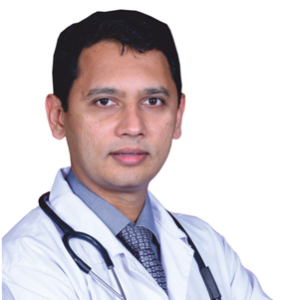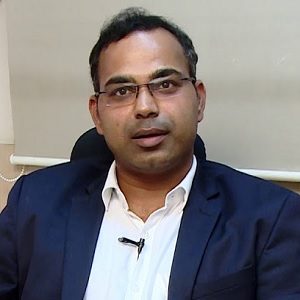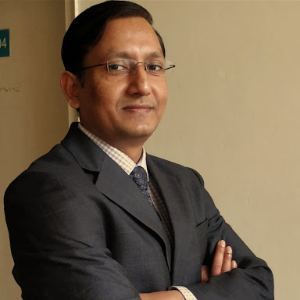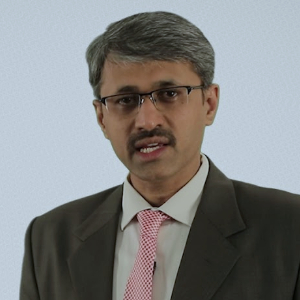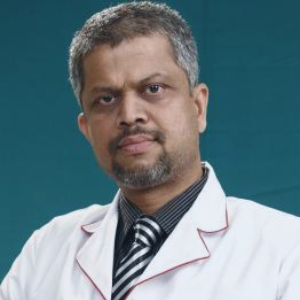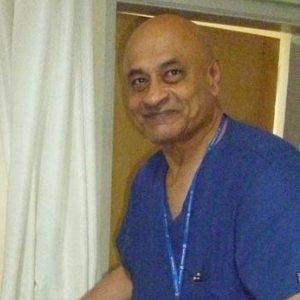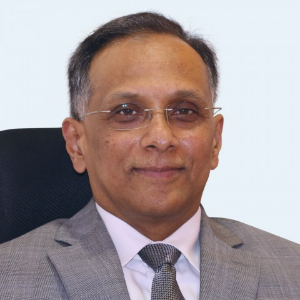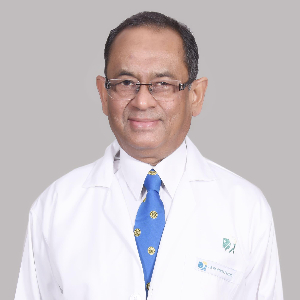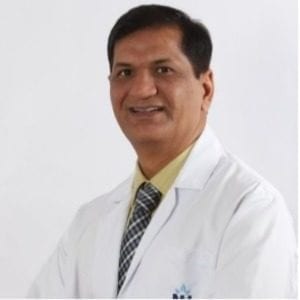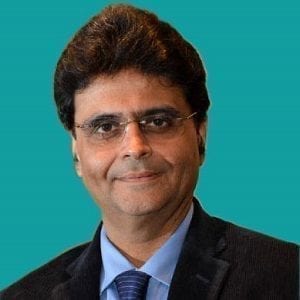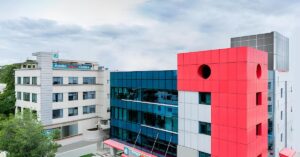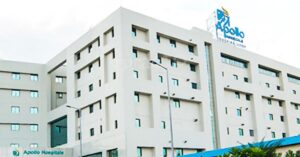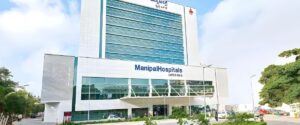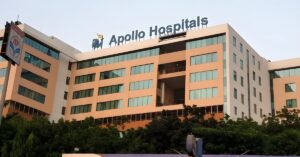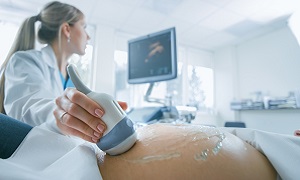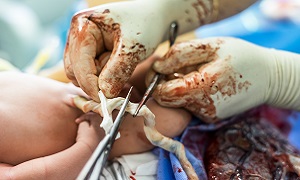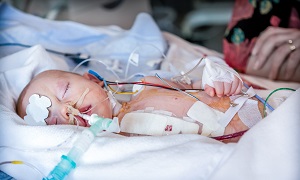Best Doctors in India for Spina Bifida Treatment
- Neurosurgeon, Bengaluru, India
- Over 22 years’ experience
- Gleneagles Global Hospital Bengaluru
Profile Highlights:
- Dr. Madhusudan H V is an expert Neurosurgeon in South India with 22+ years of experience in neuro and spine surgery.
- With a specialization in minimally invasive neurosurgeries, Dr. Madhusudan holds the credit for more than 7000 neurosurgeries. He also finds interest in endoscopic interventions and frameless navigations.
- Spine Surgeon and Orthopaedic Surgeon, Chennai, India
- Over 18 years’ experience
- Apollo Hospitals Greams Road
Profile Highlights:
- Dr. Muralidharan Venkatesan is a consultant in spine surgery from Chennai.
- He provides comprehensive cervical (neck), thoracic (upper back), and lumbosacral (lower back) conditions treatment.
- Dr. Venkatesan pursued MBBS, MRCS, and a fellowship FRCS and shifted his specialization to spinal surgery.
- Dr. Venkatesan has his papers published in several journals.
- Orthopedic & Spine Surgeon | Max Hospital, Saket, New Delhi, India
- 14+ Years Experience
- Max Super Specialty Hospital, Saket, New Delhi
Profile Highlights:
- Dr. Om Prakash Gupta is a reputed Spine Surgeon in India.
- He is currently functioning as a Consultant – Orthopedics & Spine at Max Smart Super Speciality Hospital, New Delhi
- He has over 14 years of experience.
- Neurosurgeon & Spine Surgeon, Bengaluru, India
- Over 15 years’ experience
- Gleneagles Global Hospital Bengaluru
Profile Highlights:
- Dr. Praveen K S is a highly qualified neurosurgeon with over a decade of experience in handling all kinds of neurological diseases and disorders.
- He specializes in Pediatric Neurosurgery, Neuro-Oncology, Endoscopic neurosurgery, Aneurysms, and Neuro- Trauma and has performed over 4000 neurosurgeries in his career.
- Neurosurgeon & Spine Surgeon, Mumbai, India
- Over 20 years’ experience
- Wockhardt Hospital Mumbai
Profile Highlights:
- Dr. Rahul Modgi is a highly established neuro and spine surgeon in Mumbai specializing in all types of brain and spine surgeries.
- Dr. Rahul Modgi’s name has been recorded in the Limca Book of Records in 2014 when he removed the heaviest iron rod from the brain of a 17-year-old patient. He has also performed various other risky surgeries for which he has greatly appreciated.
- Top Orthopedic Surgeon & Spine Surgeon | Apollo Hospital, New Delhi, India
- 30+ Years Experience
- Indraprastha Apollo Hospital, New Delhi
Profile Highlights:
- Dr. Rajagopalan Krishnan is a well-known orthopedic and spine surgeon in India.
- He is one of the most highly accomplished and successful spine surgeons in Delhi performing more than 350 spine surgeries every year.
- He provides management and treatment of spinal disorders that includes disc and degenerative disorder, spinal tumor, spinal fractures, spinal trauma, and spinal infections.
- Neurosurgeon, Bengaluru, India
- Over 30 years’ experience
- Fortis Hospital Banerghatta Bengaluru
Profile Highlights:
- Dr. Rajakumar V Deshpande is a renowned Neurosurgeon in Bengaluru. He performed the first pedicle screw fixation surgery for a spine injury in Bangalore.
- Dr. D V Rajakumar specializes in endoscopic neurosurgeries and has performed some of the most complex brain and spine surgeries through the endoscopic approach. His other areas of interest include minimally invasive neuro surgeries, management of cerebrovascular diseases, and brain tumor surgeries.
- Top Neurosurgeon & Spine Surgeon | Apollo Hospital, New Delhi, India
- 30+ Years Experience
- Indraprastha Apollo Hospital, New Delhi
Profile Highlights:
- Dr. Rajendra Prasad is one of the most experienced Neurosurgeons and Spine surgeons in India.
- Dr. Rajendra Prasad is an expert in all neuro and spine surgeries that including micro neurosurgery, minimally invasive spine surgery, surgery for degenerative spine diseases, surgery for brain and spine trauma, and neuro tumor surgeries.
- Orthopedic and Spine Surgeon, Gurugram, India
- Over 25 years’ experience
- W Pratiksha Hospital
Profile Highlights:
- With over 25 years of experience, Dr. Rajesh Kumar Verma can be generally considered a boon for people suffering from complex, bone, joint, or spine disorders.
- Currently known as one of India’s leading spine experts in India, Dr. Rajesh Kumar Verma performs as many as 50 surgeries in a month. The types of surgeries he performs include all types of spine surgeries, joint replacements, as well as complex trauma surgeries.
- Orthopedic Surgeon & Spine Surgeon, Mumbai, India
- Over 25 years’ experience
- Lilavati Hospital & Research Centre
Profile Highlights:
- Dr. Ram Chaddha is a specialist Spine Surgeon in Mumbai with expertise in the management and treatment of all kinds of spinal disorders for over 25 years.
- Dr. Chaddha is trained in Minimally Invasive Spine Surgery and is also among the few surgeons in India to hold expertise in Minimally Invasive Cosmetic Spine Surgery.
- Dr. Ram Chaddha spent a considerable number of years training undergraduate and postgraduate students and has also been an examiner for such courses at Mumbai University.
Best Hospitals in India for Spina Bifida Treatment
- City: New Delhi, India
Hospital Highlights:
- Equipped with 650 beds, BLK-Max Super Speciality Hospital is the largest stand-alone private sector hospital in Delhi.
- With over 1500 healthcare providers and 150 globally renowned super specialists, the hospital is one of Asia’s largest BMT Centres. The hospital is known for having some of the best cancer doctors in the country.
- The hospital is NABH and NABL accredited and was inaugurated by the first Prime Minister of India. Pt. Jawahar Lal Nehru.
- City: Hyderabad, India
Hospital Highlights:
- Located in the vibrant city of Hyderabad, Apollo Health City is a world-renowned medical facility that provides outstanding care and treatment to patients coming from different parts of the world.
- Founded in 1988, this 550-bed multispecialty hospital with 50 specialties and 12 Centres of Excellence continues to deliver outstanding outcomes for patients with the simplest to the most complicated medical conditions.
- Backed by the latest medical equipment and a dedicated team of professionals, the hospital provides comprehensive treatment across various specialties including, cardiology, critical care, neurosciences, cancer, orthopedics, gynecology, ENT, transplants, gastroenterology, etc.
- Apollo Health City is a cutting-edge healthcare facility that combines various facilities under one roof. These may include state-of-the-art physical medicine, rehabilitation, and wellness services with education, research, telemedicine, innovative medical devices, disease management programmes, and medical talents.
- The hospital is known for offering top-notch cancer treatment accompanied by cutting-edge facilities and technology.
- The hospital also offers a broad spectrum of cosmetic procedures that improve not just appearance but also comfort.
- In 2011, Apollo Health City was the recipient of the Asian Hospital Management Award (AHMA).
- In 2013, the Government of India recognized Apollo Health City as the top medical tourism destination in the country.
- City: Mumbai, India
Hospital Highlights:
- Kokilaben Dhirubhai Ambani Hospital, Named after the wife of Indian industrialist Dhirubhai Ambani, the founder of Reliance Industries, this is one of the top hospitals in Mumbai. This 750-bed multi-specialty hospital became operational in 2009. Known as one of India’s most advanced tertiary care facilities, the hospital is designed to raise India’s global standing as a healthcare hub, with an emphasis on excellence in clinical services.
- Kokilaben Dhirubhai Ambani Hospital uses Protocol and Care Pathway based treatment models to ensure the best outcomes for patients.
- The hospital represents a confluence of top-notch talent, cutting-edge technology, state-of-the-art infrastructure, and, most importantly commitment.
- The hospital also holds the accreditation of the NABH, NABL, CAP, and JCI.
- The hospital has been recognized as the No. 1 Multispecialty Hospital in Mumbai and the West Zone for the fifth year in a row in 2020 by The Week.
- City: Chennai, India
Hospital Highlights:
- Apollo Cancer Centre in Teynampet, Chennai is one of the best super speciality hospitals in India. It is the country’s first ISO-certified healthcare facility.
- Additionally, it is the first hospital in Chennai and the first oncology hospital in India to receive NABH accreditation.
- The hospital provides advanced tertiary care in oncology, orthopedics, neurology and neurosurgery, head and neck surgery, and reconstructive and plastic surgery.
- Additionally, it offers specialized healthcare of international standards with results comparable to those of the best hospitals in the world.
- It is outfitted with 300 beds, the newest and greatest technology, a large pool of highly qualified specialists, and a committed team of medical and paramedical professionals.
- It is one of the first few medical facilities in India to offer comprehensive cancer care. A team of skilled medical, surgical, and radiation oncologists makes up the Tumour Board, which is a component of the complete treatment planning system. After reviewing reported cases, the Board determines in concert with diagnostic specialists what course of action is best for each individual patient. The panel is further supported by dieticians, medical counselors, speech therapists, and other pertinent specialists.
- The hospital launched the first ExcelsiusGPS® Spine Robot in South India and has completed over 50 surgeries till date.
- It is also one of the few cancer hospitals in India to offer Cyber Knife therapy. Till now it has completed 1320 Cyber Knife therapies.
- The institution is also one of the few in India with the capacity to do transplants and find a prospective unrelated donor. The hospital has performed over 1000 BMTs till now.
- Furthermore, it has an exceptional milestone of performing exultant Micro vascular free tissue transfer and Aesthetic surgeries on more than 1000 patients with success.
- City: Chennai, India
Hospital Highlights:
- Apollo Hospitals, Chennai, is one of the best hospitals for heart care in India. Over the years, Apollo has expanded all over India, as a healthcare chain.
- India’s first ‘Only Pancreas’ transplant was performed in Apollo Hospital. The hospital is known for successfully performing Asia’s first en-bloc combined heart and liver transplant, and over the years, it has attained a remarkable achievement in the global healthcare space. Around 3-4 organ transplants are performed in the hospital per day.
- Equipped with over 500 beds, this hospital in Chennai was established in 1983 and since then has been among the most preferred hospital for patients from all over the world.
- The hospital holds accreditation of the NABH and JCI and is the first hospital in India to be ISO 9001 and ISO 14001 certified. It is also the first South Indian Hospital to receive subsequent reaccreditation from the JCI USA 4 times.
- City: Chennai, India
Hospital Highlights:
- Established in 1999, Gleneagles Global Hospital, Chennai, is one of the top healthcare facilities in Southern India. It is part of the Gleneagles Hospital Chain, which is the fourth largest healthcare chain in the country. The hospital specializes in multi-organ transplants of kidneys, liver, lungs, heart, etc.
- The hospital has an excellent infrastructure and state-of-the-art lab and equipment set-up. The hospital boasts cutting-edge technologies, a highly skilled team of doctors and surgeons, and trained support staff. Located in Perumbakam, Chennai, it is one of India’s premier health care destinations. The hospital has performed some of the most complex surgical and clinical procedures in India including multi-organ transplantations.
- The hospital’s lung transplantation program is one of the best in the country. The hospital is known for having performed India’s first single lung transplant and first minimal invasive lung transplant. It is also the only Indian hospital to be associated with King’s College Hospital, London, United Kingdom for liver transplantations.
- City: Hyderabad, India
Hospital Highlights:
- KIMS Hospital (a brand name of Krishna Institute of Medical Sciences) is one of the largest and best multi-speciality hospitals in Hyderabad. The hospital provides various treatments to an enormous number of patients.
- The hospital has a capacity of more than 3000 beds. KIMS Hospitals offers different healthcare services in more than 25 specialities and super specialities.
- The hospital is equipped with modern medical equipment and technology. It has robotic equipment to provide minimal invasive techniques for patients.
- The hospital is aimed at providing world-class healthcare facilities and services at an affordable cost for patients.
- The various specialities and departments of the hospital include neurosciences, gastroenterology & hepatology, robotic science, reproductive sciences, dental science, oncological sciences, organ transplantation, heart and lung transplantation and mother and child care.
- City: Kolkata, India
Hospital Highlights:
- Established in 2003, Apollo Gleneagles Hospitals is a 750-bed multispecialty tertiary care hospital situated in Kolkata.
- With 33 Centres of Excellence and more than 50 specialties, Apollo Gleneagles Hospitals, Kolkata is capable of handling all sorts of patients.
- This tertiary care hospital, which is a 100% subsidiary of Apollo Hospitals Enterprise Ltd., India, is regarded as one of Kolkata’s top hospitals.
- The facility is a complete blend of cutting-edge technology, state-of-the-art infrastructure, and genuine hospitality.
- Focusing on numerous specialties, the hospital provides all-inclusive medical treatments supported by cutting-edge technology and a staff of highly qualified medical specialists.
- Patients across the globe come to Apollo Gleneagles Hospitals Kolkata for their treatment. Moreover, international patients receive full attention and assistance for their treatment and are provided with a hassle free experience.
- Apollo Gleneagles Hospitals, Kolkata is the only hospital in Eastern India to hold the Joint Commission International (JCI) certificate.
- It is also the only hospital in Kolkata to hold the NABL accreditation in six different categories, which includes Clinical Biochemistry, Clinical Pathology, Hematology & Immunohematology, Microbiology & Serology, and Histopathology & Cytopathology.
- Furthermore, Apollo Gleneagles Hospitals, Kolkata is known for performing the first ever Reverse Shoulder Prosthesis Replacement in East India.
- City: Bengaluru, India
Hospital Highlights:
- Established in 1991, Manipal Hospital, Old Airport Road, Bangalore is the flagship facility of the Manipal Hospitals Group, which is one of the largest networks of Multispecialty Private Hospitals in India.
- The facility is well-known for its state-of-the-art technology, performance-driven, patient-centric, and evidence-based approach.
- The facilities offered at Manipal Hospital meet the highest international standards, allowing the hospital to attract a large number of national and international patients.
- Their expertise encompasses the diagnosis and treatment of a wide range of diseases in several specializations that address both simple as well as complex medical procedures.
- There are total 600 beds accessible in the hospital for the in-patients so they may heal while being closely watched after by the medical team. In addition, it has 144 critical care units, including NICUs, ICCUs, and ICUs. Apart from that, the hospital also offers 20 contemporary, modular state-of-the-art operating rooms with all the amenities needed.
- The hospital has several departments that are overseen by highly skilled, certified, and experienced medical experts.
- One of the best departments in the hospital is that of the Cancer department which is known for its advanced cancer diagnosis and treatment facilities such as Intracavitary Chemotherapy, Biological Therapy, HIPEC, PIPEC, Nuclear Medicine, Radiation Therapy, etc.
- It is one of the few hospitals in Bangalore that provides full range of pediatric services, including pediatric emergency services, pediatric gastroenterology, pediatric neurology, pediatric cardiology, pediatric orthopaedics, pediatric allergies, pediatric immunology, and infectious diseases.
- Furthermore, Manipal Hospital, Old Airport Road, Bangalore is also regarded as one of the best hospitals for bone and spine related disorders.
- City: Mumbai, India
Hospital Highlights:
- Established in 2016, Apollo Hospitals, Navi Mumbai is one of Maharashtra’s most advanced multispecialty hospital. This 500-bed hospital provides sophisticated treatments and integrated super specialty services under one roof.
- The hospital features a cutting-edge infrastructure that houses 13 state-of-the-art operating rooms, advanced laboratory and medical diagnostics, and 120 ultra-modern I.C.U. beds, including N.I.C.U. and P.I.C.U., monitored round the clock by critical care specialists.
- With 57 specialties and subspecialties, the hospital boasts a team of renowned medical specialists who offer accurate diagnosis and treatment with easy accessibility to their patients.
- Additionally, the hospital offers highly customized, individualized health check programs that are made to fit each person’s needs in terms of lifestyle.
- Apollo Hospitals, Navi Mumbai has been accredited by both the National Accreditation Board for Hospitals and Healthcare Providers (NABH) and the Joint Commission International (JCI).
- Apollo Hospitals Navi Mumbai has been awarded the “Best Practices-International Services Award” at the annual awards for service excellence and operations excellence.
Spina Bifida
Spina Bifida also known as neural tube defect, is a birth defect that occurs when your spine and spinal cord don’t form correctly. The neural tube is the structure in a developing embryo which eventually becomes the brain of the child, spinal cord as well as the tissues enclosing them.
In normal cases, the neural tube forms early during pregnancy and it closes by the 28th day after conception. In babies with spina bifida, one portion of the neural tube fails to close or develop properly, which results in defects in the spinal cord and the spinal bones.
Spine Bifida can be mild as well as severe, as it depends on the type of defect, location, size as well as complications. When required, early treatment for spina bifida will involve surgery, but the problem isn’t always resolved by such treatment.
Types of Spina Bifida
There are three main types of spina bifida, which include myelomeningocele, meningocele and spina bifida occulta.
1.Myelomeningocele- The most common and serious type of spina bifida which involves a sack outside the opening in the back of the baby somewhere in the spine, which contains parts of the spinal cord as well as nerves which will get damaged. People who have myelomeningocele can have physical disabilities which may be moderate to severe and some of such disabilities can include:
- Incontinence
- Difficulty in going to the washroom
- Inability in moving or feeling one’s legs or feet
2.Meningocele- Meningocele is another type of spina bifida which involves a sack of fluid outside an opening in the back of the baby. However, the sack doesn’t contain any part of the spinal cord, as there isn’t much nerve damage, this kind of spina bifida only leads to minor problems.
3.Spina Bifida Occulta- This is another mild type of spina bifida which also goes by the term ‘hidden spina bifida’, as it doesn’t cause any disabilities and might go unnoticed until later in life. Usually, there is no opening the in back of the baby but only a gap in the spine. In this type, there is also damage to the spinal cord or the nerves.
Symptoms of Spina Bifida
Each type of spina bifida shows different symptoms and they can vary from person to person as well.
Symptoms of myelomeningocele spina bifida can include:
- Over some of the vertebrae the spinal canal is open, often in the middle or lower part of the back
- Weak or paralyzed muscles in the leg
- Membranes and spinal cord pushed outside the back in a skin-covered sack
- Deformed feet
- Uneven hips
- Seizures
- Scoliosis
- Issues with the bowel and bladder
Symptoms of meningocele can include the following:
- Sack that is visible at birth
- Small opening at the back
- Membranes which are pushing out through the opening in the vertebrae into the sack
- Normal spinal cord development
Spina bifida occulta symptoms include- - No visible opening outside
- A gap in between vertebrae
- No fluid-filled sack outside the body
- Small cluster of hair on the back
- A small area of extra fat on the back
- Small birthmark such as a dimple on the back
Causes of Spina Bifida
All the exact causes of this ailment are still not understood properly. However, it is known that combination of genetics and environmental factors are involved. A child who is born with spina bifida might not have any relatives with this condition but genetics does play a factor. It is also believed that lack of folic acid (vitamin B-9) can play a role in this ailment. Other factors that are said to play a role include obesity, some kind of medications and uncontrolled diabetes in the mother.
Diagnosis of Spina Bifida
Pregnant women will be offered prenatal screening tests for checking for spina bifida and other birth defects. These tests aren’t perfect. Some mothers had positive blood tests have babies without spina bifida. Even if the result is negative, there is a slight chance that the spina bifida is present, so consider talking to your doctor regarding prenatal testing, its risks and you now need to handle the results.
Though spina bifida can be screened using maternal blood tests, typically ultrasound is used for diagnosis in most cases.
Maternal Serum Alpha-Fetoprotein test
For Maternal Serum Alpha-Fetoprotein test, a sample of the mother’s blood is drawn to be tested for alpha-fetoprotein, a protein that is produced by the baby. It’s quite normal for a little amount of AFP to cross the placenta and enter the mother’s bloodstream, but abnormally high levels of AFP suggests that the baby has a neural tube defect, which can be spina bifida, even though high levels of AFP don’t occur always in spina bifida.
Test to Confirm high AFP levels
Varying levels of AFP can also be caused by other factors, which include a miscalculation in the fetal age of multiple babies. Therefore, your doctor might order another blood test for confirmation, If the results are still high, you will need even further evaluation, which will include an ultrasound exam.
Other blood tests
Ultrasound
Fetal ultrasound is the most accurate method for diagnosing spina bifida in the baby before delivery. Ultrasound may be performed during the first trimester and second trimester. Spina bifida can be diagnosed accurately in the second-trimester ultrasound scan. This exam, therefore, becomes quite important to identify and rule out congenital anomalies like spina bifida.
An advanced ultrasound can also detect signs of spina bifida, which includes an open spine or particular features in the brain of the baby, which indicate spina bifida. An expert can easily assess the severity of the ailment using ultrasound.
Amniocentesis
If the prenatal ultrasound confirms the diagnosis of spina bifida, your doctor might request amniocentesis. During this process, your doctor removes a sample of fluid from the amniotic sac surrounding the baby using a needle. The purpose of this examination is to rule out genetic diseases, even though spina bifida is rarely associated with genetic diseases.
Treatment options for Spina Bifida
The treatment for spina bifida may vary as it always depends on the severity of the condition. While spina bifida occulta won’t require any treatment, other types do.
Surgery before birth
Nerve function in babies who have spina bifida can get worse after birth, if spina bifida isn’t treated. Prenatal surgery to treat spina bifida takes place before the 26th week of pregnancy. In this procedure, surgeons expose the uterus in the pregnant mother surgically open the uterus and repair the baby’s spinal cord. In some patients, this procedure can be performed even less invasively with a fetoscope through ports in the uterus.
According to research, children with spina bifida who goes through fetal surgery have reduced disability and are less likely to require crutches or any such walking devices. Fetal surgery can reduce the risk of hydrocephalus as well. Consult with your doctor whether this procedure is appropriate for you. Talk regarding the potential benefits and risks such as possible premature delivery as well as other such complications.
It is also quite important to have a comprehensive evaluation to determine whether fetal surgery is feasible. This specialized surgery should only be done at a proper health-care facility that has experienced doctors in fetal surgery. A multispeciality team approach and neonatal intensive care are also important. The team typically includes a fetal surgeon, a pediatric neurosurgeon, a maternal-fetal medicine specialist, a fetal cardiologist as well as a neonatologist.
Cesarean birth
Surgery after birth
Surgery is required for babies with myelomeningocele, and the earlier it is performed, the earlier the risk of infections will be minimized. It will also help in protecting the spinal cord from being exposed to further trauma.
During this procedure, the neurosurgeon will place the spinal cord along with the exposed tissue inside the baby’s body, after which he will cover them with muscle and skin. At the same time, the neurosurgeon might place a shunt in the baby’s brain for controlling hydrocephalus.
Treatment for complications
For babies having myelomeningocele, there has been already irreparable nerve damage and usually a multispeciality team of surgeons, physicians and therapists might be required. Babies having this ailment might need even more surgery to treat a variety of complications. Some of these complications might include weak legs, bladder and bowel problems or hydrocephalus, which usually begins soon after birth.
Depending on the severity of spina bifida and the complications, the treatment options can include:
- Walking and mobility aid- Some babies can start exercises to prepare their legs for walking with the aid of braces of crutches as they get older. Some children might need walkers or wheelchairs. Mobility aids combined with regular physical therapy can help a child in becoming independent. Even children who require wheelchairs can learn to function quite well and become self-sufficient.
- Bowel and bladder management- Routine evaluation of bowel and bladder evaluations as well as management plans can help in the reduction of the risk of organ damage and illness. Evaluations can include X-rays, kidney scans, blood tests, ultrasounds and bladder function studies. These evaluations will have to be done frequently in the first few years of life but it can become lesser, as the child continues to grow.
- Surgery for hydrocephalus- Most babies who have myelomeningocele, will require a surgically placed tube which can allow fluid in the brain to drain into the abdomen. This tube might be placed just after the baby is born, during the surgery to close the sac located on the lower back or later as the fluid accumulates. A less invasive option is also available which is called endoscopic third ventriculostomy. However, candidates are chosen very carefully for this and they need to meet certain criteria. During this procedure, the surgeon will use a small video camera to see inside the brain. He makes a hole in the bottom of between the ventricles so cerebrospinal fluid may flow out of the brain.
- Treatment and Management of other complications- Special equipment which includes bath chairs, commode chairs as well as standing frames might help with daily activities. Whatever the issue, orthopedic complications or tethered spinal cord, most of them can be treated or managed to help improve the child’s quality of life.
Prevention of Spina Bifida
Taking folic acid in supplement form at least one month before one’s conception and continuing through the first trimester of the pregnancy can greatly reduce the risk of spina bifida and other neural tube defects. Having plenty of folic acid in the system by the early weeks of pregnancy is important if you want to prevent spina bifida. Since many women don’t realize that they are pregnant till this time, it is recommended by experts that women who are of childbearing age, should take at least a daily supplement of 400 micrograms of folic acid. Food such as rice, pasta, enriched bread and some breakfast cereals are rich in folic acid.
Women who are planning or expecting pregnancy should also remember to consume at least 400 to 800 mcg of folic acid per day. The human body doesn’t absorb folate as easily as it can absorb synthetic folic acid and therefore it is important that you take vitamin supplements as well. It is also quite possible that folic acid will help to reduce the risk of other birth defects, including cleft lip, cleft palate as well as some congenital heart defects.
It is quite a good idea to eat a healthy diet, including foods that are rich in folate or enriched with folic acid. It is seen to be present naturally in several foods, such as egg yolks, milk, beans, peas, citrus fruits, juices, avocados, dark green vegetables, etc.

